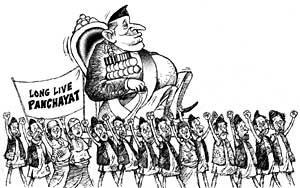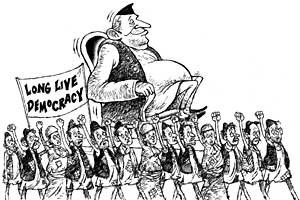 Although things started going horribly wrong halfway through it, Democracy-I delivered many good things since 1990:
Although things started going horribly wrong halfway through it, Democracy-I delivered many good things since 1990: A slew of domestic airlines made the passenger king instead of the RNAC's ticket tout. Quality schools sprang up to meet pent up demand. Medical emergencies no longer required a trip to Vellore, Bombay or Bangkok. Electric vehicles did make Kathmandu's air a bit cleaner, now we need to phase out brick kilns. Newspapers and FMs verge on robust anarchy as they compete to inform the Nepalis who have long stopped switching to foreign wavelengths. Apartment housing has sprung up with the promise of urban renewal. Even the Bagmati, at least at Pashupati, has become cleaner.
 But were these things the result of enlightened politics or simply pent up forces bursting forth in new found freedoms? The political changes in April 1990 were brought about less by the leadership of political parties than by a restive middle class catalysed by the civic protests of artists, poets, journalists and professionals. Good things started happening when entrepreneurs were pushed by the catalysing activism of civil society, and were no longer shackled by an omnipotent Panchayat bureaucracy. They happened despite 12 unstable governments in as many years, and would have continued if not stymied by two tragedies:
But were these things the result of enlightened politics or simply pent up forces bursting forth in new found freedoms? The political changes in April 1990 were brought about less by the leadership of political parties than by a restive middle class catalysed by the civic protests of artists, poets, journalists and professionals. Good things started happening when entrepreneurs were pushed by the catalysing activism of civil society, and were no longer shackled by an omnipotent Panchayat bureaucracy. They happened despite 12 unstable governments in as many years, and would have continued if not stymied by two tragedies: The first and primary culprit was the descent into veniality of the elected who put themselves up for sale. This led to the next tragic chain that morphed into the Maoist violence. When the senate and the praetorian guards auction their services, it is not the law-abiding mahajans that avail of them but fixers and wheeler-dealers. National policies then become short-term profit skimming with no thought for those beyond the Kathmandu Valley rim.
 The excluded exploded in anger, and the Maoists who never received more than minority votes in any election were quite effective in exploiting this. Because they do not believe in suffering free dissent or entrepreneurship not sanctioned by its politburo, it is doubtful if the Maoists path of 'Destruction before Creation' can ever create enough wealth to satisfy everyone.
The excluded exploded in anger, and the Maoists who never received more than minority votes in any election were quite effective in exploiting this. Because they do not believe in suffering free dissent or entrepreneurship not sanctioned by its politburo, it is doubtful if the Maoists path of 'Destruction before Creation' can ever create enough wealth to satisfy everyone. If neither a rent-seeking parliament nor destructive comrades are the answer, then how do we resume building prosperity with economic growth that we started in the early 1990s once sanity returns? Mass aspirations can be satisfied, not by a market that caters to elite luxury, but only by one that caters to mass needs. Mass markets function best with mass politics having built-in checks and balances. Ergo: a democracy with a critically engaged civil society, innovative entrepreneurs free but bold enough to take risks and a government that is representative, receptive and responsive.
We had them all, so why did it unravel? If Democracy-II is to succeed, what is the minimum reform it must undergo? Democracy is ultimately about equality, where a level playing field excludes none that subscribes to its rules. But what if elected representatives who are supposed to maintain the rules capture the field for themselves? What should be done to make sure Democracy-II will not be another tragic rerun of hijacked Democracy-I?
One of the prerequisites of a functioning democracy is the separation of state powers. This has been the fatal flaw in our constitution. On one extreme, the judiciary is theoretically so independent it has been accountable to none for the mismanagement therein, a situation that has been termed "judicial anarchy". At the other end, a venal parliament could disband local governments which-by lasting their two full terms-were the only functioning institution of Democracy-I.
The most serious flaw, however, has been the fusing of the legislature with the executive along the Westminster model (which, as Lord Meghnad Desai maintains, does not even work in an England that is integrating with the EU). MPs were no longer trying to become good law makers, but rent-seeking traders amassing public funds to get themselves re-elected to repeat the cycle. Even the MPs in opposition failed to raise their voices in protest simply because they eventually hoped to replace the executive to continue the very same business. If the Russian, Swiss or American models were followed that do not allow an MP to simultaneously hold an executive job, perhaps we will go a long way in making sure that politics becomes public service instead of a public disservice. l



